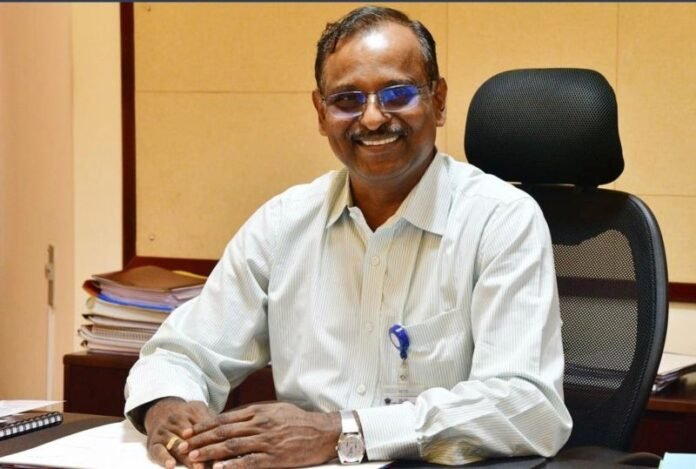New Delhi: The appointments committee of the cabinet announced January 7 that Rocket scientist Dr V Narayanan will be the next chairman of the Indian Space Research Organisation (ISRO) and the secretary of the Department of Space (DoS).
In a notification on January 7, the Appointments Committee of the Cabinet said Dr V Narayanan will have a tenure of two years. Currently the head of ISRO’s Liquid Propulsion Systems Centre (LPSC), Narayanan will succeed S Somanath on January 14 as the 11th chairman of India’s premier space research organisation.
“The Appointments Committee of the Cabinet has approved the appointment of V Narayanan, Director – Liquid Propulsion Systems Centre, Valiamala as Secretary, Department of Space and Chairman, Space Commission for a period of two years with effect from January 14, 2025, or until further orders, whichever is earlier,” an official order from the Ministry of Personnel, Public Grievances and Pensions, Department of Personnel and Training stated.
A distinguished scientist with nearly four decades of experience in rocket and spacecraft propulsion, Dr V Narayanan, 61, joined ISRO in 1984 and functioned in various capacities. During the initial phase, he worked in the Solid Propulsion area of Sounding Rockets and Augmented Satellite Launch Vehicle (ASLV) and Polar Satellite Launch Vehicle (PSLV) at Vikram Sarabhai Space Centre (VSSC).
In 2018, he was appointed Director of the Liquid Propulsion Systems Centre (LPSC), one of the major centres of the ISRO, having its headquarters at Valiamala in Thiruvananthapuram, with a unit in Bangalore. The centre is engaged in developing liquid, semi-cryogenic propulsion stages for launch vehicles, chemical and electric propulsion systems for satellites, control systems for launch vehicles, and transducer development for space systems health monitoring.
Under Dr Narayanan’s leadership as Project Director for the GSLV Mk III’s C25 Cryogenic Project, the C25 Stage — a vital part of the GSLV Mk III vehicle — was successfully developed. He has contributed to the process planning, process control, and realisation of Ablative nozzle systems, composite motor cases, and composite Igniter cases. Under his guidance, the LPSC delivered 183 Liquid Propulsion Systems and Control Power plants for various ISRO missions.
Narayanan’s work on the cryogenic systems formed the basis of India’s major launches including Chandrayaan-2, Chandrayaan-3, and Aditya-L1. The LPSC, under Narayanan, is working on making the cryogenic stages and launch vehicles that will be used in the mission human-rated for the upcoming human spaceflight mission Gaganyaan.
On the LPSC website, Narayanan’s profile talks about how, when India was initially developing the cryogenic stage of the GSLV Mk-II vehicle in the late 1980s, the country needed some hardware to be imported from the Union of Soviet Socialist Republics (USSR). Narayanan was, thus, in charge of not only doing research and development for the project, but also coordinating with USSR counterparts, managing contracts and missions. Later, in 1993, when the US blocked a deal made by India to procure cryogenic engine technology from Russia, Narayanan was one of the key people who set out to develop indigenous cryogenic engines in order to not rely on external sources.
Dr Narayanan’s academic journey started with a diploma in mechanical engineering (DME). Later, he went on to take the AMIE (Associate Member of the Institution of Engineers) examination, which is recognised as equivalent to an engineering degree by the Government of India. Before joining ISRO in 1984, propulsion scientist Narayanan worked in various organisations including TI Diamond Chain, Bharat Heavy Electricals Limited (BHEL) Trichy and Madras Rubber Factory for a year and half.
He completed his MTech in Cryogenic Engineering and PhD in Aerospace Engineering from IIT Kharagpur. He also received a silver medal for achieving the first rank in the MTech degree. As he became one of the pioneers of novel cryogenic propulsion technology in India, he worked on his PhD thesis in aerospace engineering simultaneously and received his doctorate from IIT Kharagpur in 2001. He has over 1200 internal ISRO reports and 50 journal papers to his name. He received an honorary Doctor of Science (Honoris Causa) degree from Chennai’s Sathyabama University.
Dr V Narayanan’s thesis, titled ‘Thrust & Mixture Ratio Regulation System of Cryogenic Rocket Engines’, formed a pivotal part of India’s development of indigenous cryogenic propulsion systems, making it only the sixth country in the world to achieve this feat.
Dr Narayanan has been bestowed with numerous distinguished awards. He received the ASI Award for Rocket and Related Technologies and a Gold Medal from the Astronautical Society of India (ASI). He has won several ISRO awards, including the Outstanding Achievement Award, Performance Excellence Award, and Team Excellence Award, in addition to the High Energy Materials Society of India’s Team Award.
He also chairs the Programme Management Council — Space Transportation Systems (PMC-STS), which makes decisions in all launch vehicle projects and programmes. He also heads the National Level Human Rated Certification Board (HRCB) for Gaganyaan, India’s planned human spaceflight mission.
Interestingly, with Narayanan’s appointment, for the third time in a row a director of LPSC has been appointed the next ISRO chairman. S Somanath and his predecessor K Sivan, too, served as heads of LPSC before their ISRO chief tenures.
Raksha Anirveda's editorial desk team brings in the collective experience of creative professionals - a fine mix of senior copy editors, writers, proofreaders and designers. Working as a team, they continuously create, manage, and curate content to sustain the magazine's profile and reputation in line with market trends and achieve magazine's goal.





